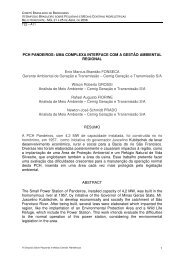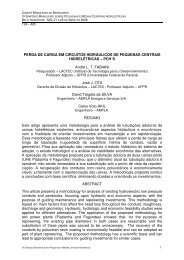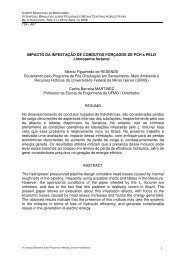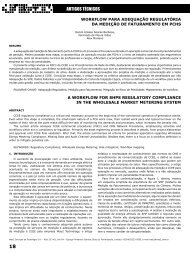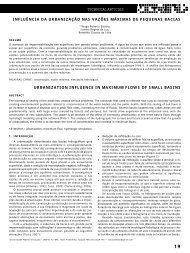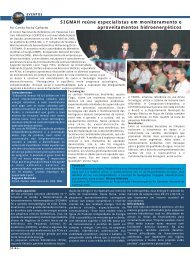Qual a perspectiva das PCH para futuro? - CERPCH - Unifei
Qual a perspectiva das PCH para futuro? - CERPCH - Unifei
Qual a perspectiva das PCH para futuro? - CERPCH - Unifei
Create successful ePaper yourself
Turn your PDF publications into a flip-book with our unique Google optimized e-Paper software.
INTERNAUTA<br />
As matérias abaixo são divulga<strong>das</strong> pelo site do CER<strong>PCH</strong>, que possui uma seção com notícias<br />
atualiza<strong>das</strong> sobre o mercado de energia, <strong>PCH</strong>s e o setor elétrico. O site ainda contém<br />
informações fabricantes, eventos e cursos. Para maiores informações acesse:<br />
BID quer estimular novos projetos na América Latina<br />
O Banco Interamericano de Desenvolvimento (BID) lançou esta<br />
semana uma iniciativa visando respaldar o consumo de energias renováveis<br />
na América Latina, diante da crescente demanda na região<br />
de créditos e suporte técnico, depois da alta dos preços do petróleo<br />
e do sucesso do etanol no Brasil.<br />
A iniciativa "Energia sustentável e mudanças climáticas" foi lançada<br />
em uma reunião de dois dias em Washington, da qual partici<strong>para</strong>m<br />
cerca de 400 pessoas da América Latina, Estados Unidos e<br />
Europa, explicou Antonio Vives, gerente do departamento de desenvolvimento<br />
sustentado do BID.<br />
O projeto "pretende estimular ou desenvolver o interesse nos países<br />
<strong>para</strong> o empreendimento de ações que tendam a tornar mais<br />
sustentável o consumo de energia, usando energias renováveis ou<br />
eficiência energética com o objetivo de minimizar o impacto que isto<br />
possa ter nas mudanças climáticas", afirmou.<br />
A instituição oferecerá empréstimos e apoio técnico ao setor público<br />
e privado da América Latina: "Por exemplo, se quiser construir<br />
uma refinaria de etanol, o banco estará em condições de oferecer<br />
financiamento <strong>para</strong> esta finalidade", ressaltou Vives.<br />
O etanol é precisamente "uma <strong>das</strong> fontes de energia renovável<br />
que estamos dispostos a apoiar, baseando-nos na experiência<br />
bem-sucedida do Brasil", declarou o responsável do BID, que admitiu<br />
que vários países da região já haviam manifestado seu interesse.<br />
"Temos uma grande demanda de apoio de muitos países <strong>para</strong> repetir<br />
o sucesso do Brasil", o maior produtor e exportador mundial<br />
de etanol combustível, que hoje é utilizado em 80% dos carros novos<br />
vendidos neste país".<br />
"Com os preços atuais do petróleo, muitos países querem poder<br />
produzir de algum modo sua própria energia, seja ela hidrelétrica<br />
ou térmica", acrescentou o executivo do banco, que está disposto<br />
ainda a financiar a produção de energia eólica, solar e biotérmica.<br />
Vives disse, entretanto, que o objetivo da iniciativa do BID não é deixar<br />
de consumir hidrocarbonetos ou carvão na América Latina, onde<br />
se encontram vários produtores de petróleo como a Venezuela e<br />
o México, mas que "pretendemos fazê-lo do modo mais limpo possível".<br />
De fato, segundo o gerente da instituição, "a América Latina é responsável<br />
por uma proporção muito pequena de todos os gases do<br />
efeito estufa produzidos no mundo", muito menos do que os países<br />
desenvolvidos, bem como do que a China e a Índia. Esta situação<br />
oferece outra oportunidade <strong>para</strong> a região que poderia aproveitar<br />
do "mecanismo de desenvolvimento limpo do Protocolo de Kyoto<br />
<strong>para</strong> obter créditos<br />
Fonte: Gazeta Mercantil<br />
30/11/06<br />
10<br />
IADB wants to encourage new projects in Latin America<br />
This week, facing the growing demand of carbon credit and technical<br />
support in the region after the rise in the prices of oil and the<br />
success of ethanol in Brazil, the Inter-American Development Bank<br />
launched an initiative aiming at giving support to the consumption<br />
of renewables in Latin America.<br />
The initiative called “Sustainable energy and climatic changes”<br />
was launched on the course of a two-day meeting in Washington.<br />
Approximately 400 people from Latin America, the USA and Europe<br />
were there, explained Mr. Antonio Vives, manager of IADB's department<br />
for sustainable development.<br />
“The project aims at encouraging or developing the interest in actions<br />
that tend to make the energy consumption more sustainable<br />
in the countries by using renewable energy or energy efficiency.<br />
The goal is to mitigate the impact on the climatic changes,” he said.<br />
The Institution will offer loans and technical support for the public<br />
and private sectors of Latin America: “For example, if somebody<br />
wants to build an ethanol refinery, the bank will have the conditions<br />
to offer the offer the resources for this enterprise,” highlighted Mr.<br />
Vives.<br />
“Based on Brazil's successful experience, ethanol is precisely one<br />
of the renewable energies that we are willing to give support,” said<br />
Mr. Vives. He also admitted that several countries of the region have<br />
aready shown their interest. “We have a great request for support<br />
coming from many countries that want to duplicate Brazil's<br />
Success, the largest ethanol producer and exporter in the world. Today,<br />
about 80% of the cars sold in Brazil use this fuel”.<br />
“With the current oil prices, many countries want to be able to produce<br />
its own energy, whether it is hydraulic or thermal energy”, he<br />
added. The bank is still willing fund the production of wind, solar<br />
and bio-thermal energy. Mr. Vives, however, said that IADB's goal<br />
is not stop consuming hydrocarbons or coal in Latin America, where<br />
there are several oil producers such as Venezuela and México,<br />
but we intend to do it in as clean as possible”.<br />
In fact, according to MR. Vives Latin America, together with China<br />
and India, is responsible for a very small proportion of the world<br />
production of greenhouse gases, much less than in the developed<br />
countries. This situation offers another opportunity for the region<br />
that could used the Clean Developed Mechanism of the Kyoto Protocol<br />
to obtain credits<br />
Source: Gazeta Mercantil<br />
Nov/30/06



